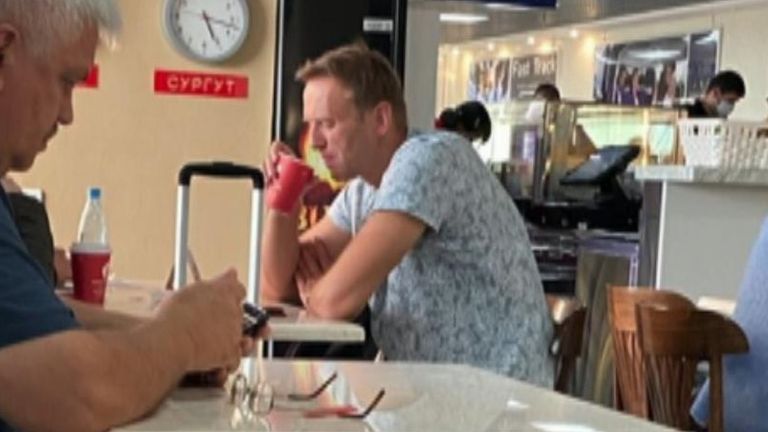The opposition leader has been placed on a ventilator in intensive care after being taken ill during a flight to Moscow.

Russia’s most prominent opposition leader is in a coma after suspected poisoning left him “screaming in pain” on a flight to Moscow.
Alexei Navalny, 44, a long-time critic of Russian President Vladimir Putin, is unconscious in intensive care in a hospital in the city of Omsk, according to his spokeswoman Kira Yarmysh.
Foreign Secretary Dominic Raab said he was “deeply concerned” about the reported poisoning, adding: “My thoughts are with him and his family.”
Mr Navalny was placed on a ventilator and is “in a coma in grave condition,” Ms Yarmysh said on Twitter.
Tatyana Shakirova, a regional health ministry spokeswoman, confirmed that Mr Navalny was in hospital and his condition considered serious.Advertisement
She refused to confirm Ms Yarmysh’s belief, saying: “The poisoning version is one of several versions being considered. It’s not possible now to say what the reason was.”
A Kremlin spokesman said doctors were doing all they could to ensure he recovers, adding that they wish him a “speedy recovery”.
Dmitry Peskov said any poisoning would need to be confirmed by laboratory tests and that authorities would be ready to consider a request for Mr Navalny to be treated abroad, should one be made.
The pro-democracy campaigner was taken ill during a flight to Moscow from the city of Tomsk, his condition forcing the plane to make an emergency landing in Omsk, so he could receive medical attention.
A fellow passenger described hearing him “screaming in pain” before he was taken off the plane on a stretcher.
Ms Yarmysh tweeted: “Alexei has a toxic poisoning.”
She added: “We assume that Alexei was poisoned with something mixed into the tea. It was the only thing that he drank in the morning.
“Doctors are saying the toxin was absorbed quicker with hot liquid,” she said, adding that Mr Navalny’s team called police to the hospital.
But Anatoliy Kalinichenko, deputy chief doctor at the Omsk hospital, would not confirm Ms Yarmysh’s assertion, saying poisoning was one of a number of causes medics were considering.

He said the activist, whose wife Alexis arrived at the hospital later, was in a grave but stable condition, but refused to give details because of confidentiality laws.
A passenger on the flight, Pavel Lebedev, said: “At the start of the flight he went to the toilet and didn’t return.
“He was really sick and is still screaming in pain. They didn’t say what exactly happened to him. We landed in Omsk. Ambulance arrived.”
Ms Yarmysh later tweeted: “Police demand to inspect Navalny’s personal belongings, including his luggage.”
A staunch critic of the Kremlin, Mr Navalny was jailed for 30 days last year for violating strict protest laws and calling for unauthorised demonstration in Moscow which led to the arrests of more than 1,000 people.
Whilst being held, he contracted an illness diagnosed as “contact dermatitis”, but which he said could have been a poisoning.
He attempted to stand in the 2018 presidential race but was barred because of previous fraud convictions in a case he again said was politically motivated. He has described the country’s main party, Mr Putin’s United Russia, as a “party of crooks and thieves”.
In June, the anti-corruption campaigner described a vote on constitutional reforms, which allow Mr Putin to serve another two terms in office, as a “coup” and a “violation of the constitution”.

Navalny’s Foundation for Fighting Corruption has been exposing graft among government officials, including some at the highest level.
Last week he was accused of stirring mass protests in Belarus by the country’s authoritarian leader, President Alexander Lukashenko.
Kremlin foes have been poisoned or fallen ill after suspected poisonings before. Moscow has always denied any involvement.
In March 2018, Sergei Skripal, a former Russian spy, and his daughter, Yulia, were left critically ill after being targeted in Salisbury by Russian agents using novichok, a nerve agent, but recovered.
Mother-of-three Dawn Sturgess died from novichok poisoning after her partner Charlie Rowley found a contaminated bottle discarded by the perpetrators, believing it to be a perfume bottle.
In 2006, Russian defector Alexander Litvinenko died in London after being poisoned with radioactive polonium-210, believed to have been administered by agents working for the Kremlin. The suspects have denied any wrongdoing.

As the Kremlin’s most prominent domestic critic, with a long back catalogue of widely read and forensically investigated exposes of Russia’s corrupt bureaucracy to his name, Alexei Navalny has made himself a lot of enemies.
He has suffered endless arrests and prolonged periods in detention as well as regular street-level harassment. In one incident in 2017, his sight in one eye was permanently damaged after green antiseptic dye was thrown at him.
And last year, in detention, he suffered an allergic reaction his doctor said might have been the result of poison.
This latest incident – a suspected poisoning – appears to be far more serious.
Alexei Navalny’s spokeswoman at his anti-corruption foundation, Kira Yarmysh, who was sitting next to him on a flight from Tomsk to Moscow when he fell ill, says he is in a coma and hooked up to a ventilator.
She believes the evasive manner of the hospital doctors – now that the place is crawling with police – only confirms that he was poisoned.
Based on his Instagram account, Navalny had been in the Siberian city of Tomsk, in part at least, to support the campaigns of local deputies taking on the ruling United Russia party in this September’s regional elections.
It is part of his call for “smart voting”, to encourage people to vote for anyone other than United Russia.
Who knows who the next target of his anti-corruption campaign was set to be, but all those he has profiled to date have hefty grudges to bear.
Poisoned tea – which Ms Yarmysh assumes to be the cause here – has its precedents. Think no further than Kremlin critic Alexander Litvinenko, who directly accused Vladimir Putin of his own slow murder from his deathbed.

Russian investigative reporter Anna Politkovskaya was poisoned drinking tea on a flight on her way to cover the school siege in Beslan in 2004. She recovered, but was assassinated two years later – most probably because of her investigations into Chechnya’s wars and its warlords.
